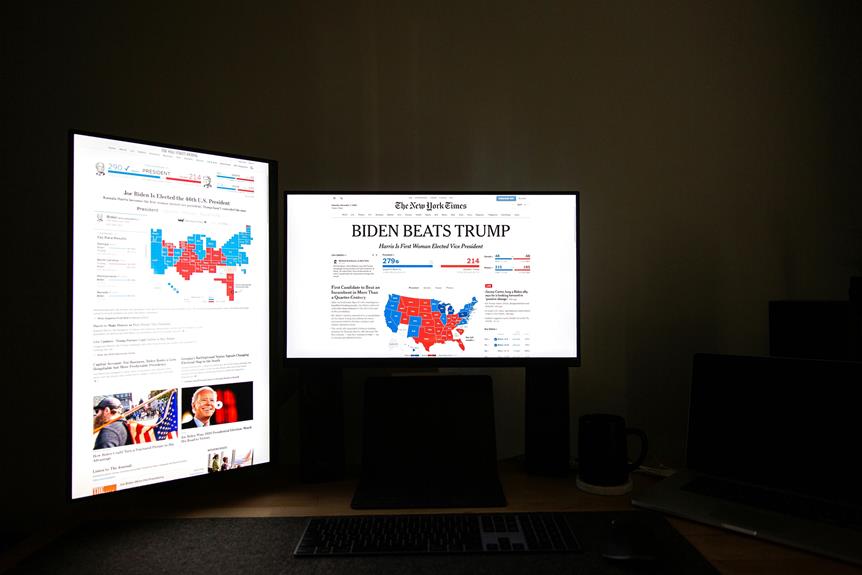
Donald Trump is facing a revised federal indictment that alleges he subverted the 2020 election results. Issued on August 27, 2024, the indictment introduces charges of conspiracy to commit fraud and blocking the certification process. It emphasizes Trump's actions as a political candidate, particularly attempts to influence officials like Mike Pence. The legal strategy appears to address Supreme Court rulings regarding presidential immunity, focusing on specific conduct rather than presidential actions. As the case unfolds, it raises significant implications for Trump's political future and public perception, suggesting a complex landscape ahead for his supporters and opponents alike.
Overview of the Indictment
While the political landscape continues to shift, Donald Trump now faces a revised federal indictment issued on August 27, 2024, centered on allegations of subverting the 2020 election results.
This indictment analysis highlights significant charges against Trump, including conspiracy to commit fraud and efforts to block the certification of election results.
Unlike previous accusations, this revision focuses specifically on his actions as a political candidate, emphasizing attempts to influence officials rather than his presidential conduct.
The charges retained from earlier indictments underscore the persistent concerns surrounding election fraud and the integrity of democratic processes.
As the case progresses, the implications may reverberate through Trump's political future, shaping public perception and potentially impacting the upcoming election.
Legal Context and Implications
In light of the recent Supreme Court ruling, the legal context surrounding Donald Trump's revised indictment reveals significant implications for the prosecution's strategy.
The ruling established constitutional questions regarding presidential immunity, prompting the Justice Department to refine its approach by focusing on Trump's actions as a candidate rather than as president.
This shift reflects a calculated exercise of prosecutorial discretion aimed at maintaining the case's viability.
By omitting certain allegations, such as pressure on the Justice Department, the prosecution seeks to align its arguments with the Supreme Court's guidance.
Legal experts suggest this strategic narrowing enhances the likelihood of convictions, emphasizing the importance of election-related laws in shaping the case's trajectory.
Key Charges and Allegations
The revised indictment against Donald Trump outlines several serious charges that center on his alleged conspiracy to undermine the certification of the 2020 election results.
Key allegations include efforts to block the certification process and pressuring then-Vice President Mike Pence to reject electoral votes.
The indictment also highlights Trump's promotion of false claims of election fraud, suggesting a coordinated approach with extremist groups during the January 6 Capitol riot.
These conspiracy dynamics indicate a calculated strategy to influence electoral outcomes and manipulate public perception.
Testimonies from pivotal witnesses, such as former Arizona House Speaker Rusty Bowers, are expected to bolster the prosecution's case, underscoring the gravity of the charges as they relate to the integrity of the electoral process.
Political Reactions and Impact
Political reactions to Donald Trump's indictment have sharply divided public opinion and reshaped the political landscape as the upcoming election approaches. This legal development has heightened political polarization, with Trump's supporters labeling the indictment as a politically motivated attack designed to undermine his campaign.
Conversely, Democrats argue that accountability is essential for maintaining the rule of law. Opinion polls reflect a narrow lead for Kamala Harris over Trump, suggesting that ongoing legal battles might greatly impact electoral influence.
Mixed responses from Republican leaders further illustrate the schism within the party, as some rally behind Trump while others express concern over his candidacy. The implications of this indictment will likely reverberate throughout the election cycle, influencing voter perceptions and strategies on both sides.
Future Legal Proceedings
Ongoing legal challenges are set to unfold as Trump's indictment advances through the judicial system, with pre-trial motions and hearings anticipated in the coming months.
Legal experts suggest that the trial timeline might extend considerably due to complex arguments surrounding jurisdiction and the interpretation of election laws.
Trump's defense team is preparing various tactics, likely focusing on legal precedents established by the Supreme Court regarding presidential immunity.
The prosecution's strategy, led by Special Counsel Jack Smith, will also play an essential role in shaping the proceedings.
As the case progresses, media attention will amplify, influencing both public opinion and Trump's political future amid the backdrop of considerable election-related concerns across the nation.
Trump's Defense Strategy
Amid the mounting legal challenges, Trump's defense strategy is taking shape with a focus on leveraging established legal precedents surrounding presidential immunity.
His defense team is likely to employ tactics that argue his actions as a candidate, rather than as a sitting president, shouldn't be subject to criminal prosecution.
They may challenge the applicability of laws related to election interference, asserting that his conduct falls within the bounds of political discourse.
By highlighting these legal precedents, Trump's lawyers aim to create reasonable doubt about the prosecution's claims.
This approach could potentially minimize the perceived severity of the charges, framing them as politically motivated rather than legally justified, thereby shaping public perception and influencing the judicial process.
Impact on 2024 Election
Trump's legal challenges are poised to markedly influence the dynamics of the 2024 election. As the indictment unfolds, various factors will shape voter behavior and campaign strategies:
- Voter Mobilization Strategies: Candidates may need to enhance their outreach efforts, galvanizing supporters around the themes of accountability and electoral integrity.
- Election Misinformation Campaigns: Misinformation may proliferate, with parties leveraging Trump's situation to either galvanize support or sow doubt about the electoral process.
- Public Perception: Ongoing legal battles could shift public opinion, complicating Trump's appeal among moderate voters who prioritize stability.
Role of the Justice Department
The Justice Department plays a pivotal role in steering through the legal complexities surrounding Donald Trump's indictment, particularly in the context of election-related offenses.
Utilizing prosecutorial discretion, the department strategically narrows the focus of charges to align with legal precedents and election laws. This careful case management addresses constitutional implications while maintaining public accountability.
The Justice Department's actions may also be scrutinized for potential political motivations, raising questions about judicial independence in high-profile cases.
As law enforcement proceeds, the department must balance its mandate to uphold the rule of law with the necessity of ensuring a fair trial.
These dynamics underscore the intricate relationship between legal proceedings and the broader political landscape surrounding election integrity.
Public Opinion and Perception
As public sentiment shapes the narrative surrounding Donald Trump's indictment, perceptions of the legal proceedings have become increasingly polarized.
Many voters express concerns about the implications for democracy and electoral integrity. This situation raises essential questions about voter trust in the electoral process, particularly in light of the following factors:
- Allegations of Election Manipulation: Trump's actions during the election period have led to skepticism about the legitimacy of electoral outcomes.
- Political Polarization: Supporters perceive the indictment as a politically motivated attack, while opponents view it as a necessary accountability measure.
- Impact on Upcoming Elections: The ongoing legal battles could influence voter perceptions and decisions as the election date approaches.
Ultimately, these dynamics will profoundly affect public trust in future elections and the political landscape.
Comparison With Previous Indictments
In comparing the revised indictment related to the 2020 election with Trump's previous legal challenges, distinct differences emerge in both scope and strategy.
The previous indictments primarily focused on actions taken while Trump was president, while this one emphasizes his conduct as a candidate, reflecting a legal strategy evolution aimed at addressing the Supreme Court's ruling on presidential immunity.
This previous indictments comparison highlights a shift toward narrower allegations, omitting controversial pressures on the Justice Department.
By concentrating on claims of conspiracy to overturn election results, the revised indictment appears to streamline the prosecution's case, potentially increasing its viability in court.
This strategic adjustment underscores the complexities of maneuvering legal challenges amid shifting political landscapes.
Broader Election Integrity Issues
Concerns about election integrity have intensified in recent years, fueled by a series of high-profile incidents and allegations surrounding the 2020 election.
The landscape of American politics has shifted, revealing vulnerabilities in electoral processes that have implications for public trust.
Key issues contributing to these concerns include:
- Voter Suppression: Policies that disproportionately impact marginalized communities, limiting their access to the ballot.
- Election Security: Ongoing debates over the integrity of voting systems and the potential for interference.
- Political Polarization: Increasing divisions among party lines that undermine consensus on electoral legitimacy.
These factors exacerbate public skepticism, threatening the foundational belief in fair elections and further complicating efforts to restore confidence in democratic institutions.
Ongoing Legal Challenges
With Trump facing multiple legal battles, the ongoing challenges present a complex web of implications for his political future and the broader electoral landscape.
The revised indictment raises significant legal precedents, particularly regarding the interpretation of presidential immunity and election-related laws. Legal experts note that the constitutional implications of this case could redefine the boundaries of accountability for public officials.
As Trump navigates these proceedings, the potential for appeals looms large, potentially prolonging the legal saga. Each phase of the trial could influence public opinion and voter perceptions, complicating Trump's campaign strategy.
Ultimately, the outcome of these legal challenges may set critical standards for future electoral conduct and the accountability of political figures in similar situations.

Samantha Yates is a dedicated journalist at BootItems.com, delivering breaking news and in-depth stories across various topics. With her keen eye for detail and passion for informative reporting, Samantha keeps readers up-to-date on the latest developments in politics, technology, and global affairs.